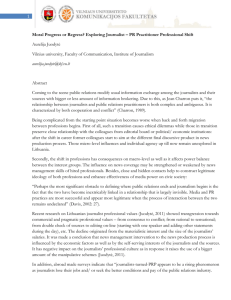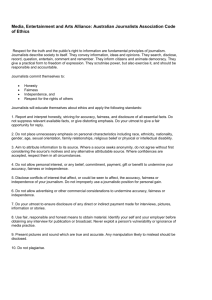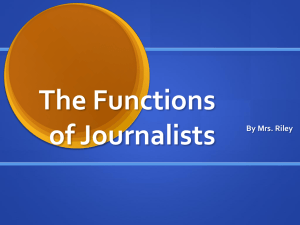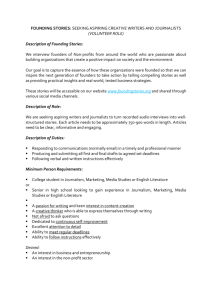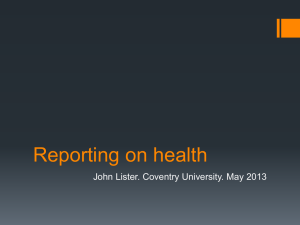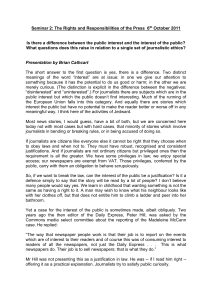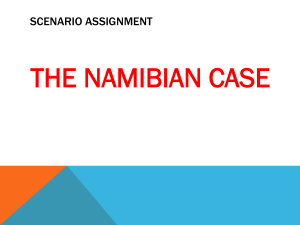To check or not to check: An exploratory study on source checking
advertisement
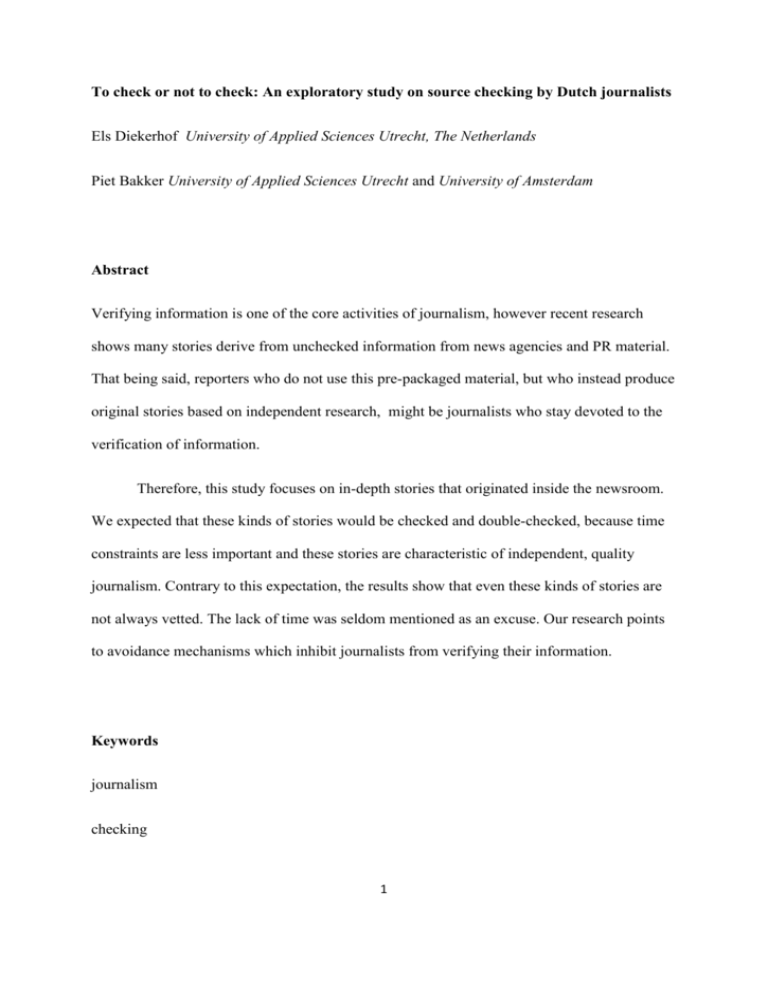
To check or not to check: An exploratory study on source checking by Dutch journalists Els Diekerhof University of Applied Sciences Utrecht, The Netherlands Piet Bakker University of Applied Sciences Utrecht and University of Amsterdam Abstract Verifying information is one of the core activities of journalism, however recent research shows many stories derive from unchecked information from news agencies and PR material. That being said, reporters who do not use this pre-packaged material, but who instead produce original stories based on independent research, might be journalists who stay devoted to the verification of information. Therefore, this study focuses on in-depth stories that originated inside the newsroom. We expected that these kinds of stories would be checked and double-checked, because time constraints are less important and these stories are characteristic of independent, quality journalism. Contrary to this expectation, the results show that even these kinds of stories are not always vetted. The lack of time was seldom mentioned as an excuse. Our research points to avoidance mechanisms which inhibit journalists from verifying their information. Keywords journalism checking 1 verifying sources credibility Journalism, sources and reliability Since journalists want to provide the public with reliable news, checking and verifying information and sources, is assumed to be important in their daily researching and reporting routines, however according to several recent studies these activities have decreased significantly. Previous research shows that many unchecked news stories end up in print and in broadcast media. But these studies focus mainly on daily news stories. In this study, we concentrate on journalistic productions that allegedly are thoroughly vetted, such as in-depth feature stories, documentaries, backgrounders, and other in-depth reporting based on the reporter’s own story ideas. Our research objective is to determine whether these stories are, indeed, checked and double-checked. In their study on the state of journalism in the United Kingdom, Lewis, Williams & Franklin (2008) show that UK media depend, to a great extent, on material from press agencies, public relation sources or other media. Their conclusion is that ‘60 per cent of published stories rely wholly or mainly on external news sources’ (30). A similar study by Dutch researchers Hijmans, Buijs & Schafraad (2009) found that at least one-third of the articles in four Dutch newspapers had manifest traces of news from other agencies, other media or third-party press releases. As 40 per cent of the stories did not cite any sources, the 2 researchers re-examined part of the material and found that more than half of the stories in that sample were based – partly or entirely – on third-party sources. Other Dutch research (Scholten & Ruigrok 2009) found that more than one-fourth of the articles in the Dutch national press were based wholly or completely on the news feed from the Dutch press agency ANP and that this percentage increased slowly between 2006 and 2008. News taken from or based on other media, PR-material or wire services is not, by definition, unreliable or worse than news from journalists of the papers themselves. But media will become increasingly similar to each other when they use more wire copy or news from other media, and they become a converter belt for PR agencies when they use press releases from these sources. A major problem with news from external sources is that it is rarely verified. Davies (2008) provided in his book Flat Earth News numerous examples of unchecked stories that found their way to the media. Lewis, Williams & Franklin (2008) found that the increasing workload of journalists made them use more third-party material and ‘that the number of checks that the typical journalist made to confirm a story was decreasing’ (40). The implicit assumption of these studies is that the ‘other’ part of the news, the original part that is gathered, researched and written by journalists of the medium itself, is thoroughly checked and researched. If ‘this other part’ still guarantees checked, reliable information and sources, the increased use of news agency copy and PR material might be less significant. In this article, we investigate that ‘other part’: are the stories that are based on the reporter’s own story idea and on his own news gathering and research, indeed, more reliable and, therefore, more credible because they are thoroughly checked? 3 We expect that reporters who do not use this pre-packaged material from outside the newsroom, but who produce original stories based on their own story ideas and on independent research, still might be devoted to checks on veracity and independent corroboration. These journalists may have a different attitude and behaviour towards checking. These journalists may be more inclined to verify the accuracy of their information and to check their sources. We expect these journalists to check and double check. We explore when and why journalists determine certain information or a certain source needs to be checked. So our dual research question is as follows: When do Dutch journalists, who work on stories based on their own story ideas, check certain information or certain sources, and what are the considerations for checking or not checking? Checking sources Why journalists need credible sources was easily explained in Gans’s landmark study Deciding What’s News: ‘Story selectors want reliable sources whose information requires the least amount of checking’ (Gans 1979: 129). In Gans’s view ‘credibility’ is an aspect of the suitability of sources. The nature of the judgment of ‘source credibility’ is arguable and has been disputed; some believe journalists rely heavily on intuition, others think their judgment is rational. Recent Israeli research suggests that it is mostly rational and only sometimes subjective (Reich 2011). The importance of checking sources is directly related to the standards of objectivity and truth-finding, which are the most important standards in journalism. Credibility, objectivity and truth-finding are important criteria for quality journalism (e.g. Hargreaves 2003: 232; Shapiro 2010; Cottle 2007). Although academics argue that there is no such thing 4 as an independent truth (e.g. Broersma 2010) and that ‘objectivity’ as a standard has been replaced by ‘balance’ (Goldstein 2007) or should be changed to ‘transparency’ (Hobsbawn 2006), in journalism practice, checking stories is the inevitable duty of journalists. Checking facts and checking sources, should, according to the standards of ethics and quality, be one of the important activities of journalists as they gather information for their stories. Research, however, shows a gap between theory and practice. Journalists may claim that checking is important, but they do not live up to that standard. The already mentioned recent works of Lewis et al. (2008), Lewis,Williams & Franklin (2008) and Davies (2008) demonstrate that checking sources is the exception rather than the rule. Other research also shows that the verification of information seems to be not that important in the newsroom. Compared to other journalistic activities, journalists often do not mention checking or verifying sources as a separate activity (Tunstall 1971). Machill & Beiler (2009) calculated that German journalists spend approximately eleven minutes per day checking sources and information. Lewis et al. (2008) found that the average number of checks per story was still more than three. The majority of journalists said that they check fewer sources now than they did in the past (Lewis et al. 2008: 46). Checking considerations When it is obvious that certain information comes from certain sources, journalists do not feel the need to check. As Gans (1979: 130) stated, 5 When reporters can explicitly attribute information to a source, they do not have to worry about reliability (and validity), the assumption being that once a story is ‘sourced’ their responsibility is fulfilled, and audiences must decide whether the source is credible. Journalists construct their stories through attribution, linking information directly to sources. These sources serve as a form of evidence (Carlson 2009). Journalists like to use quotations when attributing as ‘quoted material becomes the fact of being from the source and, therefore, requires no verification beyond its accurate attribution’ (Carlson 2009: 527). The status of the source is an important factor in deciding whether information needs to be verified. Some sources are believed to be more reliable than others; that is, there is a hierarchy in credibility. Reliance on official sources is one of the most reproduced findings in journalism studies (Carlson 2009). Journalists believe that authoritative sources cannot afford to lie in public (Gans 1979: 130). Ross’s (2007) study on gender differences in journalistic sources also shows a preference for elite male sources. Dimitrova & Strömbäck (2009: 84) compared Swedish and American newspapers and found that the US press uses official sources more frequently. We could expect that as journalists have the Internet readily accessible, checking information would be relatively easy, although the credibility of online information is not always easy to determine (Keen 2007; Garrison (2000);Messner & Di Stasio (2008), suggest that journalists believe in the credibility of online information and weblogs. Dutch journalists, while agreeing that the Internet makes their work easier, are critical about the reliability of the information from websites. Nonetheless, 54 per cent of the journalists use the Internet for verification of information on a daily basis (Pleijter, Hermans & Vergeer 2007). 6 Method Our research question is: When do Dutch journalists, who work on stories based on their own story ideas, check certain information or certain sources, and what are the considerations for checking or not checking? To gain insight into the journalistic activities concerning checking and journalists’ attitudes towards checking, a mixed method is needed. Studies that are limited to text analysis focus on the final journalistic product and do not give insight into the process of the checking behaviour, in the way journalists judge the reliability of their sources. Therefore we combined analyses of the journalistic productions, with interviews of the journalist who produced the stories. We analysed the use of sources in journalistic productions and discussed these analyses with the writers. In this way, we could describe, in detail, the routine activities as well as the specific actions concerning the checking of sources for every journalist. This mix of analyses of the work itself and the explanations of the journalists who produced it, reveals the ‘information seeking behaviour’ (Case 2007: 5) as well as the journalists’ attitudes and activities in the gathering, evaluating and checking of information provided by sources. We selected 22 journalists who regularly produce in-depth stories based on their own ideas. As stated earlier, we assume there is a difference between checking during the process of (quick) newsgathering and checking while gathering information for in-depth stories based on one’s own ideas and angles. We assume that journalists producing these kinds of stories do verify their sources, that they are concerned with the reliability of their sources, and that they double-check information and sources when necessary. We argue that gathering information 7 for feature stories, investigative reporting stories, documentaries and other stories beyond the reporting of current affairs is more thorough. The 22 journalists we interviewed work in different fields of journalism: regional and local newspapers (11), national newspaper (1), public broadcasting (2), newsweeklies (4), magazines (2) and freelance (2). The reporters were asked to send us five recent productions that were produced with considerable research from various sources. They sent us recent work that they took pride in and that was based on their own story ideas. For each journalist, we selected the three most recent productions as it was easier to reconstruct the working method from them. The number of journalists (22) and the number of analysed journalistic productions (64, two stories lacked sufficient sources) are too small to draw representative conclusions on the quantity of certain checking procedures, but a better understanding of the nature of the journalistic information gathering and checking behaviours was garnered. We analysed follow-ups, feature-stories, profiles, documentaries, reconstructions and investigative stories. For every journalistic product, we made a list of all the sources used in it. Every piece of information that could be attributed to a source was registered. If the source itself was not mentioned, we wrote down the possible sources although attribution of information to (digital) documents was not possible in most cases. We kept the classification schedules simple because these lists of sources were also the starting point for the interviews. The journalists could easily identify the framework of sources for their own articles. For every journalistic product, we identified (1) the information used, (2) the nature of the information (fact, opinion, experience), (3) the source type (document, human, images, sound) and (4) the kind of source (e.g. expert, ‘vox pop’, authorities, victims). These 8 classifications provided insight into the way the journalists conducted their research, for example, if they used mainly formal human sources or if they used more opinions than facts. Using these comprehensive lists and a semi-structured topic-list, we reconstructed the research tools and research strategies used for finding and checking sources for every article or documentary. The journalists were then interviewed with respect to the information gathering and source checking of the productions they submitted. The first part of the interview consisted of the reconstruction of the production of the story. This reconstruction included (1) the angle, (2) the browsing for information, (3) the focused research and (4) the (fact) checking. The second part of the interview focused on how journalists determined the reliability of their sources. Using our source classification lists, we asked whether and how they verified the information provided by human sources, and if and how they checked the facts. When do journalists check? Our respondents claim that they check sources when (1) they ’feel’ their sources have a certain interest in the issue, or (2) it is quick and easy to check the (factual) information provided by their source. Most journalists claim they know when they need to check their sources. They say they have a professional attitude that makes them superstitious if the reliability of a source is questionable. Particularly, we found that political journalists and investigative reporters know which cases need sound checking. This applies when conflicting interests are at stake. Experienced reporters have a ‘gut feeling’ when interests or false intentions play a role. In such cases, they check the credibility of their sources. A political reporter working for a local newspaper stated, 9 I am always superstitious when there are different interests. I really think of my role as the ‘fourth estate’. I cannot check all the information provided by my sources in documents, but I do check what they say by asking other people about it. An older, more experienced political reporter for a local newspaper leaves the newsroom to find out, on the spot, if the information given by his sources is correct. The inhabitants told me that the new shelter for the homeless would be too close to the children’s playground; that children would find needles of the drug addicts in their sand pit. I want to see for myself which distance this new shelter is from the playground. An experienced investigative journalist writing on crime and working often with anonymous sources and informants knows the reliability of the people involved in the scene, ‘but we verify everything we hear from anonymous sources by asking other sources’. The majority of journalists check the facts when it can be easily done. They use Google, their own archives and (online) registers. Journalists working for local newspapers and reporting on local issues just go to the site. This process results in fast checking to verify if the factual information given by human sources is correct. When sources use vague expressions, facts can be checked in registers of commerce or land registers. Most journalists are familiar with these registers and use them. ‘Using the commerce register, we had a quick overview of all the transactions in which the alderman was involved,’ stated a reporter of a regional newspaper. 10 When journalists do not check Although journalists know when to check sources, they have numerous reasons to withdraw from checking. The reporters we interviewed often told us that information from people they spoke to was not verified. There are several occasions when journalists do not check. The most important factors for not checking include (a) the type of information, (b) the status of the source, (c) the journalist’s experience, and (d) the special demands of the journalistic workplace. The kind of information used by sources determines whether journalists decide to verify the information. Journalists who write large, in-depth feature stories containing many different opinions often said they do not see the need to check. ‘An opinion is true in itself, just like experiences. In my stories, I elaborate on different feelings and opinions. No need to check,’ stated a freelance investigative reporter. A journalist working for a major local newspaper said much the same thing. ‘I never check the information of people I talk to, but I look for someone with a different opinion.’ The status of the source is also an important factor in the decision to check or not to check. General reporters from local newspapers told us they usually do not corroborate the statements of official, authoritative sources, such as mayors, aldermen and local CEOs. They argue that checking their statements is not necessary because people in high positions cannot afford to not to tell the truth as the personal consequences are too huge. One reporter stated, ‘I only check sources when they use certain numbers or specific facts. But it depends very much on the people who talk; if a manager tells me something, I do believe what he says.’ A 11 reporter of a national newspaper said, ‘In general, people in high positions don’t tell you nonsense. Otherwise they weren’t appointed. They have no reason to swindle.’ The experience and expertise of journalists also play an important role with respect to the checking of information. Beat reporters who know everyone and everything in a specific field rarely verify the information from their sources. They have known the people/sources for many years and are convinced of their credibility. Experienced journalists use their intuition when talking to new sources. They trust in this experienced intuition. As an older journalist of a local newspaper claimed, ‘Experience plays an important role; you have to be critical but only on certain issues. After years in journalism, you recognize suspicious issues and you know when information needs to be checked, and when you don’t have to.’ Contrary to findings of other researchers (see also next section), most journalists we interviewed did not mention lack of time as an important reason for not verifying sources and information. An exception is a general reporter of a national newspaper who said, I know, of course, you should ‘check, check, double check’. But frequently you work against the deadline and they are waiting for your story. I have learned, too, that ‘one source is no source’. But as a reporter, you also must trust your feeling. Do I believe what my sources tell me, is it trustworthy? Avoiding checks Often journalists do not even ask themselves whether to check or not to check. On several occasions, journalists just avoid checking. They do not check the information they use in their stories by themselves; rather, they leave this task to others. They leave the decision about the 12 accuracy and truth of the information in their stories to other people such as colleagues, experts and PR people. There seems to be something similar to an ‘inter-collegial hallmark for trustworthiness’. Journalists do not think it is necessary to verify a source if a colleague has already used that source. They assume their colleague verified the reliability of the source, thereby negating their need to do so. A journalist from a regional broadcasting organization told us he talked to a rather vindictive woman who had a considerable amount of inside information on a case. This journalist doubted the reliability of the information provided but because two well-known national broadcast journalists had already interviewed this woman in a television documentary, he decided to believe the woman and did not bother to verify what she said. In many cases, journalists leave the evaluation and validation of specific facts to experts outside the journalistic arena. At times, journalists send their stories, before publishing, to the experts and ask them to check the facts. This is a common and quick routine in several branches of journalism. However, some journalists go far beyond the usual routine. They ask involved stakeholders in the case to go through their stories and allow them to edit whole paragraphs of the story. A journalist of a local newspaper asked a civil servant to rewrite and improve his story on a complicated issue involving local government policy. He later regretted this because the story turned out to be rather boring, but ‘the information came from an official source; therefore, I know it is correct’. Another way of avoiding checking is based on the premise of balance in a good journalistic story. Many journalists we interviewed pointed at two (opposite) sources in their story as a support for not checking. They do not check opinions even when these opinions do 13 not seem to be based on facts. Most journalists argue an opinion is true by nature. They feel only obliged to search for another different opinion, so as to give both sides of the story. In that way, they claim they meet the requirements of a balanced story. As a journalist of a regional newspaper stated, ‘I do not check what people tell me […], but I always arrange another voice with another opinion.’ Some journalists bypass checking their sources by quoting instead of paraphrasing. They refer to the journalistic practice and standard of not being responsible for the statements of their sources. Several times, journalists have deliberately used unchecked statements by using direct quotes. They assume that these sources know what they are talking about even when the statements are not opinions but facts, and even when these facts could be incorrect or inaccurate. One reporter stated, The council manager told me the costs of the regional project were 42.7 million. That amount is very difficult to check. So, in my story, I use the amount in a quote. Therefore, the manager is responsible for the figure, not me. Another journalist from a large local newspaper argued along the same line. ‘That CEO knows he cannot afford to lie to me. If I find out that what he says is not true, he knows I will publish it.’ Discussion 14 We expected that the reporters who work on in-depth stories based on their own ideas would thoroughly vet their sources and information. We thought that these journalists might act differently compared to journalists who work on current affairs (those who were the respondents in most research to date). However, we found that even these reporters often withdraw from checking sources. Though they recognize that checking is important, in practice, they often do not check. Apparently, selective checking or avoiding checking is a general practice in Dutch journalism with no exceptions for those reporters who work on their own in-depth stories. Even for these journalists, verifying information is not as important as we assumed it would be. Our results, however, are, in some ways, supported by earlier findings, which showed the relatively modest role of checking sources as part of the journalistic process (Machill & Beiler 2009; Lewis et al. 2008: 46; Tunstall 1971). For those who are familiar with the practice of journalism, the conclusion that journalists often do not verify their sources is no surprise. It is remarkable, however, that journalists withdraw from checking even when it concerns their own stories. We did not research stories on the daily news pages or in the daily news bulletins, which start from often predictable and precooked events. We researched stories that started from the ideas of the journalists themselves. We researched the use of sources in stories the journalists themselves selected for us, stories that they were most proud of and that should have met the highest standards of journalistic quality. Journalists know that it is their responsibility to check the credibility of their sources, and they know the codes of conduct regarding checking. During the interviews, we discussed the sources the journalists used for their stories. It was obvious to them that they had to justify and explain when they did not check a source. In hindsight, the reporters could easily and rationally explain why, but while working on their stories, they admit they usually rely on 15 their professional ‘gut-feelings’. Reich’s (2011) research of Israeli journalists suggests that the judgment of sources is often reasonable and coherent (‘discretional’) and only sometimes subjective (‘visceral’). Our findings indicate that Dutch journalists most often act intuitively, but can, when asked, rationally argue whether they checked or not. Our results show that most journalists verify selectively, and while they know most of their colleagues do the same, they did not want to admit in public that they do not always check. In a journalistic article about our research (Diekerhof 2008), some journalists, who explained why they did not check, did not want us to use their names because they felt embarrassed. Clearly, they believe in the well-known standards of objectivity and of ‘check, check, double check,’ but they do not practise those standards. The main reason (British) journalists do not verify sources is because of their increasing workload and lack of time, according to Lewis et al. (2008). Our findings do not point in that direction. Dutch reporters rarely mentioned workload as an excuse for not checking. Our mixed-method does not permit general statements on ‘checking behaviour’. As the interviewed journalists had to discuss every source of their own stories, our research results are quite precise. The reasons for withdrawing from verifying seldom refer to the workload. In other words, even if they had more time for research, they would probably not have spent it verifying information or sources. Our findings are that it is not only a matter of if, when and why journalists verify their stories. We found that journalists often avoid asking themselves: to check or not to check? Sometimes they escape their journalistic duty by making others outside the newsroom responsible for the credibility of their stories. They ‘outsource’ the judgment of credibility to other parties, even to those who may have a stake in the issue. Sometimes they deliberately 16 use quotes, thus making the sources responsible for the content rather than daring to draw their own conclusions. These mechanisms, again, show the relatively modest role of checking sources as an important part of the journalistic process. References Broersma, Marcel (2010), ‘The unbearable limitations of journalism’, International Communication Gazette, 72: 1, pp. 21–33. Carlson, Matt (2009), ‘Dueling, dancing, or dominating? Journalists and their sources’, Sociology Compass, 3: 4, pp. 526–42. Case, Donald O. (2007), Looking for Information: A Survey of Research on Information Seeking, Needs, and Behavior, San Diego: Academic press. Cottle, Simon (2007), ‘Ethnography and news production: New(s) developments in the field’, Sociology Compass, 1: 1, pp. 1–16. Davies, Nick (2008), Flat Earth News: An Award-Winning Reporter Exposes Falsehood, Distortion and Propaganda in the Global Media, London: Chatto & Windus. Diekerhof, Els (2008), Nederlandse Journalisten: Niet Checken, Maar Indekken, [Dutch journalists escape from checking] http://www.denieuwereporter.nl/2008/10/nederlandse-journalisten-niet-checken-maarindekken/. Accessed 8 October 2008. 17 Diekerhof, Els (2009), ‘Indekken of checken? een verkennend onderzoek naar het checken van mondelinge bronnen in de Nederlandse journalistiek’ [Escape from checking? An exploratory study on checking in Dutch journalism], in Bert Ummelen (ed.), Journalistiek in Diskrediet [Journalism discredited], Nijmegen/Diemen: Katholiek Instituut voor Massamedia/AMB, pp. 67–79. Dimitrova, Daniela & Strömbäck, Jesper (2009), ‘Look who’s talking: Use of sources in newspaper coverage in Sweden and the United States’, Journalism Practice, 3: 1, pp. 75– 91. Gans, Herbert J. (1979), Deciding What’s News: A Study of CBS Evening News, NBC Nightly News, Newsweek and Time, New York: Vintage. Garrison, Bruce (2000), Journalists’ perceptions of online information-gathering problems’, Journalism & Mass Communication Quarterly, 77: 3, pp. 500–14. Goldstein, Tom (2007), Journalism and Truth: Strange Bedfellows, Evanston: Northwestern University Press. Hargreaves, Ian (2003), Journalism: Truth or Dare?, Oxford: Oxford University Press. Hijmans, Ellen, Buijs, Kees & Schafraad, Pytrik (2009), ‘Nieuwsbronnen en de kwaliteit van de journalistiek: Een verkennende analyse van binnenlandse nieuwsonderwerpen in vier Nederlandse dagbladen’[News sources and the quality of journalism: an exploratory analysis of home news items in four Dutch newspapers], in Bert Ummelen (ed.), Journalistiek in Diskrediet [Journalism discredited], Nijmegen/Diemen: Katholiek Instituut voor Massamedia/AMB, pp. 41–66. 18 Hobsbawn, Julia (ed.) (2006), Where the Truth Lies: Trust and Morality in PR and Journalism, London: Atlantic books. International Federation of Journalists (2003), ‘Status of Journalists and journalism ethics: IFJ principles’, 5 May, www.ifj.org/en/articles/status-of-journalists-and-journalism-ethicsifj-principles. Accessed 16 April 2011. Keen, Andrew (2007), The Cult of the Amateur: How Today’s Internet is Killing our Culture and Assaulting our Economy, London: Brealy. Lewis, Justin, Williams, Andrew & Franklin, Bob (2008), ‘Four rumours and an explanation: A political economic account of journalists’ changing newsgathering and reporting practices’, Journalism Practice, 2: 1, pp. 27–45. Lewis, Justin, Williams, Andrew, Franklin, Bob, Thomas, James & Mosdell, Nick (2008), The Quality and Independence of British Journalism, Cardiff: Mediawise/Cardiff School of Journalism, Media and Cultural Studies. Machill, Marcel & Beiler, Markus (2009), ‘The importance of the internet for journalistic research: A multi-method study of the research performed by journalists working for daily newspapers, radio, television and online’, Journalism Studies, 10: 2, pp. 178–203. Messner, Marcus & Distaso, Marcia Watson (2008), ‘The source cycle: How traditional media and weblogs use each other as sources’, Journalism Studies, 9: 3, pp. 447–63. Pleijter, Alexander, Hermans, Liesbeth & Vergeer, Maurice (2007), De Opmars van Online Nieuwsgaring: Een Inventarisatie van Veranderingen in Internetgebruik in de Nederlandse Journalistiek 2002–2006 [The Rise of Online Newsgathering: an Overview 19 of Changes in the Use of the Internet in Dutch Journalism 2002-2006], Nijmegen: Radboud Universiteit. Reich, Zvi (2011), ‘Source credibility and journalism: Between visceral and discretional judgment’, Journalism Practice, 5: 1, pp. 51–67. Ross, Karen (2007), ‘The journalist, the housewife, the citizen and the press: Women and men as sources in local news narratives’, Journalism, 8: 4, pp. 449–73. Scholten, Onno & Ruigrok, Nel (2009), Bronnen in het Nieuws: Een Onderzoek naar Brongebruik in Nederlandse Dagbladen 2006–2008 [Sources as News: a Study on the Use of Sources in Dutch newspapers 2006-2008], Amsterdam: Nederlandse Nieuwsmonitor. Shapiro, Ivor (2010), ‘Evaluating journalism: Towards an assessment framework for the practice of journalism’, Journalism Practice, 4: 2, pp. 143–62. Stenvall, Maija (2008), ‘Unnamed sources as rhetorical constructs in news agency reports’, Journalism Studies, 9: 2, pp. 229–43. Tunstall, Jeremy (1971), Journalists at Work: Specialists Correspondents: Their News Organizations, News Sources and Competitor-Colleagues, London: Constable. Contributor details Els Diekerhof is a senior lecturer at the Utrecht School of Journalism, research fellow in Cross-Media Quality Journalism at the Utrecht Faculty of Communication & Journalism, 20 and coordinator of the international European Culture & European Journalism programme. She studied Social Sciences at Utrecht University. She worked as a junior researcher at SISWO Research Institute, as a freelance educational staff member at the Dutch Union of Journalists and at the Dutch Foundation ‘Women and Media’. Since 1986 she has worked at the Utrecht School of Journalism. From 1991 until 1997 she was the School’s director. Diekerhof has published articles and books on women and journalism, on the sociology of education and, recently, on the reliability of journalistic information and sources. Her best-known book is on female journalists at Dutch daily newspapers: Diekerhof, Els, Elias, Mirjam and Sax, Marjan (1986), Voor Zover Plaats aan de Perstafel: Vrouwen in de Dagbladjournalistiek Vroeger en Nu [‘If Room in the Press-box’: Women in Newspaper Journalism at the Time and Today], Amsterdam: Meulenhoff Her latest publication is on her research into source checking: Diekerhof, Els (2009), ‘Indekken of checken? een verkennend onderzoek naar het checken van mondelinge bronnen in de Nederlandse journalistiek’ [Escape from checking? An exploratory study on checking in Dutch journalism], in Bert Ummelen (ed.), Journalistiek in Diskrediet [Journalism discredited], Nijmegen/Diemen: Katholiek Instituut voor Massamedia/AMB, pp. 67–79. Contact: E-mail: els.diekerhof@hu.nl University of Applied Sciences Utrecht, Faculty of Communication & Journalism, P.O. Box 8611, 3503 RP Utrecht, The Netherlands T +31 88481 3440 21 Piet Bakker is a professor in Cross-Media Quality Journalism at the School of Journalism and Communication at the University of Applied Sciences Utrecht (HU) and an associate professor at the Department of Communications at the University of Amsterdam/Amsterdam School of Communications Research (ASCoR). He studied Political Science at the University of Amsterdam and worked as a journalist for newspapers, magazines and radio stations. He edited and published books and articles on reading habits, media history, journalism, new media, Dutch media, international news, investigative journalism, the music industry, media innovation and free newspapers. He runs a blog on the development of free newspapers at www.newspaperinnovation.com. Bakker’s latest and forthcoming publications are, among others Bakker, Piet & Vasterman, Peter (2008), ‘The Dutch media landscape’, in G. Terzis (ed.), European Media Governance: National and Regional Dimensions , Bristol/Chicago: Intellect Books, pp. 145–56 Bakker, Piet (2008),‘The simultaneous rise and fall of free and paid newspapers in Europe’, Journalism Practice (2: 3) , pp. 427–43 Bakker, Piet & Seethaler, Josef (2009),‘Supporting Concentration or Promoting Diversity? The Impact of Free Dailies on the Austrian Newspaper Market’, in Stark, Birgit & Magin, Melanie (eds), Die Österreichische Medienlandschaft im Umbruch [The changing media landscape in Austria], Vienna: Verlag der Österreichischen Akademie der Wissenschaften, pp. 67–80 Bakker, Piet (2012), ‘Expectations, experiences & exceptions: Promises and realities of participation on PBS and commercial media websites’, in G. F. Lowe & J. Steemers (eds), Regaining the Initiative for Public Service Media (Stockholm: Nordicom, 2012), pp. 237–51; 22 Bakker, Piet (2012), ‘Aggregation, Content Farms and Huffinization: The rise of low-pay and no-pay journalism’, Journalism Practice (6: 5) Bakker, Piet, Broertjes, Pieter,Van Liempt, Ad, Prinzig, M. & Smit, Gerard (2012), ‘Source empowerment, media diversity and the bargaining journalist’(Accepted for a special issue of Journalism Practice ‘The changing dynamics between journalists and sources’(2012)) Contact: E-mail: piet.bakker@hu.nl University of Applied Sciences Utrecht, Faculty of Communication & Journalism, P.O. Box 8611, 3503 RP Utrecht, The Netherlands 23

